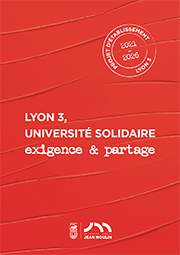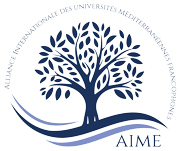AccueilRechercheProgrammes et productions scientifiquesThèsesThèses soutenuesThèses soutenues - 2006-2021Thèses soutenues - 2016
-
Partager cette page
- Recherche,
ASSOUMAL NAIBI Sidonie
Les changements climatiques, un nouvel enjeu des relations internationales : Impacts et éléments de stratégies d’adaptation au Tchad.
Publié le 4 mai 2016 – Mis à jour le 14 décembre 2018
Thèse en Science politique soutenue le 31 mars 2016.
Les changements climatiques bouleversent toute la planète. Leurs impacts écologiques et socioéconomiques sont une menace pour tous les pays, surtout ceux en voie de développement. Depuis 1990, la communauté internationale a pris conscience de ce phénomène et les pays développés sont pointés du doigt pour en être des responsables. Par conséquent, ils doivent fournir des efforts financiers et technologiques pour aider les pays les moins avancés à s’adapter. Aujourd’hui, les changements climatiques représentent un enjeu des relations internationales et sont abordés dans presque toutes les réunions internationales. Cependant, la gouvernance climatique mondiale peine à se mettre en place malgré les efforts accomplis par la communauté internationale. Les conférences sont le thé?tre de rapports de force entre les ?tats où prévalent les intérêts nationaux, souvent contradictoires. Les impacts des changements climatiques étant localisés, le Tchad appara?t comme un pays vulnérable, aux conséquences graves : avancée du désert, sécheresse, inondations, perte de biodiversité, appauvrissement des sols et diminution des ressources en eau, qui entrainent la baisse de la production agricole, l’insécurité alimentaire, les maladies, les conflits et les déplacements des populations. Bien que le Tchad soit mobilisé pour lutter contre les changements climatiques, il manque des capacités nécessaires pour relever ce défi. Cette thèse considère la zone sahélienne comme une des plus pertinentes pour l’analyse précise de ces impacts et pour la proposition de stratégies mieux adaptées pour lutter contre les changements climatiques. Il s’agit de mesures d’atténuation et d’adaptation qui consistent à mettre en ?uvre des politiques nationales plus innovantes et plus ciblées, à créer de nouvelles infrastructures dans les secteurs des transports, des télécommunications, de l’énergie, et à impliquer l’ensemble des acteurs concernés.
Climate changes are upseting the whole planet. Their écologic and socio-economic impacts are a real threat for all countries, principally the developping ones. Since 1990, the international community has becoming aware of this and the developped countries are clearly showned as being mainly responsible. Consequently, they have to financially and technologically strive in order to help the less advanced countries to adapt. Nowadays, the climate changes represent a big stake in the international relations, they are debated in almost all international meetings. However, the world climatic governing is difficult to establish by the international community. The conferences are dominated by the frequent oppositions of the States’ national interests. As the impacts of climate changes are specifically localised, Chad appears as a vulnerable country suffering dramatic consequences: progression of desert, dryness, flood, loss of biodiversity, empoverishment of soils and diminishing water ressources which imply the decreasing ot the agricultural production, food unsecurity, deseases, conflicts and deportation of population. Although Chad is mobilised to struggle against climatic changes, it lacks the necessary capacity to confront this challenge. This thesis considers the sahelian zone as one of the most relevant to precisely analyse these impacts and for proposal of efficient strategies adapted to act against climate changes. It is about measures of mitigation and adaptation which consist in operating more innovative and more targeted national politics, in creating new infrastructures in the sectors of transport, telecommunications, energy and in involving all the concerned actors.
Membres du jury :
- FONTANEL Jacques Professeur des universités, émérite Université de Grenoble -
- BANNELIER-CHRISTAKIS Ma?tre de conférences HDR Université de Grenoble -
- BUEB Renaud Ma?tre de conférences HDR Université de Franche Comté
- COUSTON Mireille Professeur des universités Université Jean Moulin Lyon 3
Président du jury : Jacques FONTANEL
Mention : Honorable
Equipe d'accueil : Francophonie
Climate changes are upseting the whole planet. Their écologic and socio-economic impacts are a real threat for all countries, principally the developping ones. Since 1990, the international community has becoming aware of this and the developped countries are clearly showned as being mainly responsible. Consequently, they have to financially and technologically strive in order to help the less advanced countries to adapt. Nowadays, the climate changes represent a big stake in the international relations, they are debated in almost all international meetings. However, the world climatic governing is difficult to establish by the international community. The conferences are dominated by the frequent oppositions of the States’ national interests. As the impacts of climate changes are specifically localised, Chad appears as a vulnerable country suffering dramatic consequences: progression of desert, dryness, flood, loss of biodiversity, empoverishment of soils and diminishing water ressources which imply the decreasing ot the agricultural production, food unsecurity, deseases, conflicts and deportation of population. Although Chad is mobilised to struggle against climatic changes, it lacks the necessary capacity to confront this challenge. This thesis considers the sahelian zone as one of the most relevant to precisely analyse these impacts and for proposal of efficient strategies adapted to act against climate changes. It is about measures of mitigation and adaptation which consist in operating more innovative and more targeted national politics, in creating new infrastructures in the sectors of transport, telecommunications, energy and in involving all the concerned actors.
Mots-Clés : Changements climatiques, environnement, biodiversité, relations internationales, vulnérabilité, risques climatiques, impacts, stratégies d’adaptation, agriculture, Tchad.
Keywords : Climate change, environment, biodiversity, international relationships, vulnerability, climatic risks, impacts, adaptation strategies, agriculture, Chad.
Membres du jury :
- FONTANEL Jacques Professeur des universités, émérite Université de Grenoble -
- BANNELIER-CHRISTAKIS Ma?tre de conférences HDR Université de Grenoble -
- BUEB Renaud Ma?tre de conférences HDR Université de Franche Comté
- COUSTON Mireille Professeur des universités Université Jean Moulin Lyon 3
Président du jury : Jacques FONTANEL
Mention : Honorable
Equipe d'accueil : Francophonie
Documentation
Mise à jour : 14 décembre 2018







